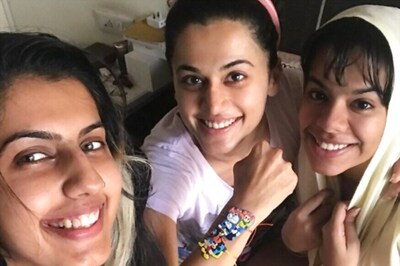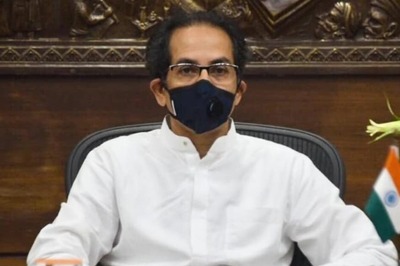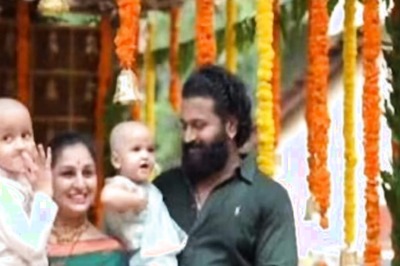
views
Let me recapitulate from where I left Part 2 of the trilogy. India with a 1% divorce rate has the lowest divorce rate globally as against the highest divorce rate of 87% in a tiny country, Luxembourg.
But the travesty of the nation is the country’s official divorce rate camouflages the real tragedy –
“Disproportionately substantial number of Indians, more particularly women, are compelled to stay in unhealthy and abusive broken marriages either because they lack financial security or suffer for the sake of their children, or the stigma attached to the divorce in Indian society.”
DIVORCE SEES UPTICK
Nonetheless, with weakening of familial linkages, increasing nuclearisation of families and more and more women joining the workforce, India is witnessing an uptick in divorce with the numbers having doubled over the past two decades, according to a United Nations report.
Getting divorce has never been easy in India. Some say it has saved Indian society so far. But divorcing a spouse suffering from mental illness in India is incredibly easy. It is granted by courts at the drop of a hat.
I begin with dissecting statutes relating to the solemnisation of marriage, its annulment and divorce in case a spouse allegedly suffers from mental disorders.
Globally most divorce proceedings are started by women but traditionally in India men seek more divorce and the brunt of divorce whether normal or on the ground of incurable/curable serious mental illnesses has been borne by the female spouses. It is testified by the case laws where most cases of divorce pertain to be filed and clinched on the ground of the wife being of “unsound mind”.
STATUTORY GROUND FOR DIVORCE OF MENTALLY ILL
It is time to recapitulate clauses pertaining to Conditions for a Hindu Marriage (Clause 5), Voidable Marriages (Clause 12) and Divorce (Clause 13) of the Hindu Marriage Act, 1955.
I have no compunction in shouting aloud that provisions of the Hindu Marriage Act stink. They are not only most insensitive to the mentally ill and discriminate against them but are primary reasons why divorce, if one spouse suffers from mental illness, is so easily granted in India.
When law is bad your lordship despite full intention to protect the mentally ill are forced to grant divorces.
For the sake of clarity all three clauses— conditions for a Hindu marriage, voidable marriage and the one pertaining to divorce— are placed together below:
First, Clause 5- Conditions for a Hindu marriage
It prescribes that for the marriage to be solemnised between any two Hindus, following conditions are required to be fulfilled, namely:
(ii) at the time of the marriage, neither party, –
(a) is incapable of giving a valid consent of it in consequence of unsoundness of mind; or
(b) though capable of giving a valid consent, has been suffering from mental disorder of such a kind or to such an extent as to be unfit for marriage and the procreation of children; or
(c) has been subject to recurrent attacks of insanity.
Instructively, the original reprehensible statutory provisions were that “neither party is an idiot or a lunatic”, which mercifully changed to the present provision by Marriage Laws (Amendment) Act, 1976. Fortunately, the recurrent attack of epilepsy has been dropped from the abominable list.
Clause 12. Voidable Marriages
It stipulates that –
(1) Any marriage solemnised, whether before or after the commencement of this Act, shall be voidable and may be annulled by a decree of nullity on any of the following grounds, namely: –
(b) that the marriage is in contravention of the condition specified in clause (ii) of
Section 5.
Clause 13. Pertaining to the divorce is lethal to the rights of mentally ill and stipulates that-
(1) Any marriage solemnised, whether before or after the commencement of the Act, may, on a petition presented by either the husband or the wife, be dissolved by a decree of divorce on the ground that the other party if either party to the marriage-
(iii) has been incurably of unsound mind or has been suffering continuously or intermittently from mental disorder of such a kind and to such an extent that the petitioner cannot reasonably be expected to live with the respondent.
[Emphasis supplied- I say without compunction that Clause 13 (1) (iii) is outright dangerous and brutally attacks the right of the mentally ill in matrimony]
Further, the following explanation of the clause exacerbates the matter substantially-
Explanation- In this Clause 13-
(a) the expression “mental disorder” means mental illness, arrested or incomplete development of mind, psychopathic disorder or any other disorder or disability of mind and include schizophrenia.
(b) the expression “psychopathic disorder” means a persistent disorder or disability of mind (whether or not including sub-normality of intelligence) which results in abnormally aggressive or seriously irresponsible conduct on the part of the other party and whether or not it requires or is susceptible to medical treatment.
It is visible to the naked eye that the law of divorce on the ground of mental illnesses militates against common sense and is contrary to the salutary provisions of the best practices Mental Health Care Act (MCHA) 2017, enacted unanimously by Parliament.
Clause 13 not only provides for easy divorce if a spouse is of “unsound mind”, but it also includes as reasons of suffering either continuously or intermittently mental disorder of such a kind and such an extent that the petitioner cannot reasonably be expected to live with the respondent.
I posit- ‘What is the reasonability test of that passenger cannot be reasonably expected to live with the respondent’
Also, the definition of “mental disorder” in the explanation is worse than the clause itself and is not coordinated with changing paradigm of mental illnesses and rights of the mentally ill enshrined in the United Nations Convention on the Rights of Persons with Disabilities (UNCRPD) of which India was an early signatory.
Plainly speaking the statutory provisions are blotched and wantonly discriminate against mentally ill spouses.
LAW COMMISSION REPORT 1974 WAS BODY BLOW
I submit that damage to the cause of the mentally ill was done by the Law Commission Report of 1974, which became the basis of the Marriage Laws (Amendment) Act, 1976. Before this Amendment, it was difficult to divorce on the ground of insanity because provisions were onerous.
The pre-1976 clause for divorce was as under-
i) Insanity (whether curable or incurable) – lasting for not less than two years ending with the filing of the petition was a ground for judicial separation
ii) Incurable insanity- lasting for at least three years immediately preceding the filing of the petition was a ground for divorce
The Law Commission report, 1974, recommended the abolition of duration for the purpose of treating it as a ground for judicial separation and divorce. The Indian Parliament not only accepted the recommendation of the Law Commission but hurled further blows by taking it on itself to explain and expand the concept of insanity, mental disorders, and unsound mind.
All the petitioner has now to prove for getting the divorce is that the “mental illness” of the respondent is such that the petitioner cannot be expected to live reasonably with him/her.
Ironically, there is no litmus test of this reasonableness.
Such deleterious statutory provisions in the twenty-first century, – ‘when paradigm related to mental illness has undergone revolutionary change and where mental illnesses even where they cannot be fully cured, can be managed with medication and lifestyle changes thereby enabling the mentally ill to lead a near normal life’, – militate against common sense.
This makes it an urgent case for repeal of the obnoxious, stigmatising, and discriminatory provisions of the Hindu Marriage Act.
Moving beyond the Hindu Marriage Act, the provisions of the Special Marriage Act 1954 applicable to civil marriages too are equally damning to the mentally ill. Parsi Marriage Act and Muslim Personal Law provisions are a shade better.
The Hindu Marriage Act, Special Marriage Act, and even some provisions of other Marriage Acts regarding marriage, annulment, and divorce if one partner is mentally ill need to be scrapped lest they cause irreversible damage to the mentally ill and to the institution of marriage itself.
EVEN JUDICIARY HASN’T BEEN ABLE TO FULLY PROTECT THE MENTALLY ILL
Unfortunately, judicial pronouncements on the subject have been confusing— there are few judgments that have protected the mentally ill but in bulk of the jurisprudence, the mentally ill have been wronged.
Now I deal with a few judicial pronouncements to prove my case-
One, way back in 1988 in a remarkably well-thought-out judgement of the Supreme Court, Justice Venkatachaliah in Ram Narain Gupta vs Rameshwari Gupta had ruled:
“Undoubtedly, mental illness is so dis-valued because it strikes at the very roots of our personhood. This is captured in part by the language we use in describing the mentally ill. One is hysteric, is a neurotic, is an obsessive, is a schizophrenic, is a manic-depressive. On the other hand, one has heart disease, has cancer, has the flu, has malaria, has smallpox”.
Justice Venkatachaliah further said, “If the mere existence of any degree of mental abnormality could justify dissolution of a marriage, few marriages would, indeed, survive in law”.
Two, in 2010, the Supreme Court division bench of justices P Sadahisa and BS Chauhan, held that under Section 13 of the Hindu Marriage Act, either spouse can seek divorce on the ground of mental illness provided sufficient evidence is placed to justify the claim. The apex court upheld the case of the Appellant, challenging the Punjab and Haryana High Court’s refusal to grant him divorce despite producing medical and other evidence to prove that his wife suffered from schizophrenia and subjected him to humiliation, assaults and threatened suicide.
Three, the Bombay High Court bench of Justices VL Achliya and Vijaya Tahilramani on January 21, 2014, in a judgement refused to grant divorce to a woman on the ground that her husband was suffering from schizophrenia and had beaten her a couple of times after marriage. It held that “Mental disorder of a husband even if proved, cannot, by itself, warrant a decree of divorce and it must be further proved that it is of such a nature as the wife could not be expected to live with the husband”.
The court added that it was clear that the respondent (husband), even if he did suffer from schizophrenia, it was not to such an extent as to make living together impossible.
The judges further said, “All mental abnormalities are not recognised as grounds for grant of decree. If the mere existence of any degree of mental abnormality could justify dissolution of a marriage, few marriages would, indeed, survive in law.”
Four, on November 6, 2015, the Chandigarh High Court ruled in a significant judgement that a man who takes a woman as his lawfully wedded wife in health cannot desert her in sickness.
The court also said that “In typical Indian social condition, if husband is suffering from illness, it is hardly ever likely that a wife will abandon him… The present petition itself is an example of how cruel a man can be to a woman in a matrimonial relationship.”
Five, in a Supreme Court Judgement, on September 19, 2013, Justice J Venkatesan ruled a man cannot dump his wife on grounds of schizophrenia as it is a treatable, manageable disease, on par with hypertension and diabetes. The judgement further added that the experiences of persons with disabilities show that labels, bad enough in themselves, come with a complete set of repercussions… Every single day, persons with psycho-social disabilities are held incapable of being a spouse, or a parent, by trial courts across the country. Few of them have the facility to move high courts in appeal, fewer still can knock on the doors of the Supreme Court for justice.
And what profound wisdom your lordship enunciated-
“No matter how well intentioned and well drafted the relevant legislation is, its poor and misguided implementation has resulted in discrimination. This should be a cause for concern and reconsideration among policymakers. As a signatory to the United Nations Convention on the Rights of Persons with Disabilities (UNCRPD), India is obliged to implement Article 23 of the convention — the right to family of persons with disabilities, as well as Article 12 — recognition of legal capacity. In a UNCRPD-compliant framework, the ipso facto granting of divorce on grounds of ‘unsoundness of mind’ would not even be possible. In fact, a person with a psycho-social disability should be allowed to file a petition for divorce on grounds of insufficient care by their spouse — this may come under the purview of the recognised ‘mental cruelty’.”
Six, the Karnataka High Court in a landmark judgement delivered on July 12, 2016, ruled against divorce where a man was seeking divorce from his wife on the grounds that she was mentally ill.
The judgement said that it is these times when the person needs the family the most, and they should not be abandoned, but cared for instead. The High Court added that only in 5% of the cases of mental illness in marriage is it so bad that the spouse cannot continue to live with them. In most other cases it is just an easy escape for a partner with whom it is no longer working out.
It further said that people resort to walking out as it is a seemingly easy option. In India, getting a divorce for mental health reasons and dumping one’s partner in an institution is very easy. This has led to a wretched life for many women and men. The ratio is skewed much more for women. Women cannot leave an asylum unless a male relative comes to take them.
The judgement added that if a partner actually has mental health concerns like depression, anxiety, or anger, it is all the more important for the other spouse to know how to communicate. They might feel lonely, angry, and sad and clear and loving communication can be a key to helping them. It can help to reduce fights, increase love, and make the bond strong.
Seven, on Oct 30, 2017, a division bench of justices TV Nalawade and SM Gavhane of the Aurangabad bench of the Bombay High Court granted divorce to a man who sought divorce from his wife on the grounds that she was mentally unsound and had shown suicidal tendencies which he feared could get him into trouble if the wife took any drastic steps due to her mental condition.
Eight, on June 24, 2019, in a judgement, a division bench of the Bombay High Court refused to grant a decree of divorce to a woman on the ground that her husband was suffering from schizophrenia and had beat her a couple of times after marriage. It ruled, “Mental disorder of the husband, even if proved, cannot by itself warrant a decree of divorce. It must be further proved that it is of such a nature that the wife could not be expected to live with the husband.”
The honourable judge added, “It is thus clear that the respondent (husband), even if he did suffer from schizophrenia, it was not to such an extent as to make living together impossible,”
Nine, on December 27, 2021, the division bench of Judges Vipin Sanghi and Jasmeet Singh of the Delhi High Court ruled that it is not easy to live with a partner who has mental health issues.
It was the case of the respondent husband that the marriage between the appellant and the respondent was the outcome of a “calculated fraud that was perpetrated by the respondent and her family members as they chose not to disclose a vital and crucial fact regarding the respondent’s mental health one of suffering from Acute Schizophrenia.”
On the other hand, the respondent averred that the appellant, his family members, friends, and relatives had met her before marriage many times, and there were numerous telephonic calls. Therefore, there was no question of the respondent suffering from any mental ailment, much less, schizophrenia, either prior to the marriage or during the subsistence of the marriage.
The court based on the combined reading of the evidence as well as the admission of the respondent said even though it may not conclusively prove that the respondent was suffering from Schizophrenia/Hebephrenia- F-20 prior to her marriage, at the time of her marriage, and; subsequent to her marriage, but it definitely raises serious doubt about the mental health of the respondent, and points to the possibility of the appellant’s allegations in regard being true.
The bench added that the evidence with regard to the respondent’s medical condition – which related to mental health, could possibly not have been garnered by the appellant without the cooperation of the respondent. Only upon medical examination of the respondent, it could be established, with definiteness whether, or not, she was suffering from schizophrenia, even though there were pointers in that direction.
Concluding the matter, the High Court held that examination by a medical specialist(s), if undertaken, would have been unfavourable to the respondent and the refusal by the respondent to undergo medical examination by the Medical Board leads to the inference that she was not prepared to face the Medical Board as that could have exposed the condition of her mental wellbeing, and would have established the allegation made by the appellant that she was suffering from schizophrenia.
The court added that “…The outright refusal by learned counsel of the Respondent to subject the Respondent to such medical examination, leaves situation at a stalemate and prevents it from arriving at the definite truth.”
The judgement said the appellant had significantly discharged the onus by leading cogent evidence, and raised a preponderance of probability, that the respondent was suffering from schizophrenia.
Therefore, the respondent was suffering from schizophrenia.
The bench stated that the failure on the part of the respondent to disclose her mental disorder before her marriage with the appellant, as alleged by him, constituted a fraud perpetrated upon the appellant and the High Court annulled the marriage between the appellant and respondent on the ground contained in Section 12(1)(b) of the Hindu Marriage Act.
And what defence of the judgement by your lordships-
“…learned counsel for the respondent is the father of the respondent, and it appears that his objectivity in dealing with the matter has been overshadowed by his love for his daughter, i.e., the respondent, which is only natural and to be expected. However, in the process, unfortunately, the life of the appellant has been ruined and he has remained stuck in this relationship for 16 years without any resolution. In the most important years of his life, when the appellant would have, otherwise, enjoyed marital and conjugal bliss and satisfaction, he has had to suffer due to the obstinacy displayed by not only the respondent, but even her father, who appears to have been calling the shots in relation to the matrimonial dispute raised by the appellant.”
Therefore, stressing that the husband had amply proved ‘cruelty’ on part of the woman, the court dismissed her appeal.
I submit that if this judgement of the Delhi High Court is made the yardstick, most marriages where husbands afterwards are diagnosed with mental illness must be declared fraud. Indian tradition is that the mental illness of men before marriage is concealed, and the dominant myth is that the responsibility of marriage will cure the mental illness of menfolks.
Most recently on March 5, 2022, a Supreme Court bench of Justices Vineet Saran and Anuradha Bose affirmed to consider the legal question of whether a spouse’s refusal to recognise a medical illness and seek medical treatment for it can constitute “cruelty” as a ground for divorce. It was hearing the Special Leave Petition against a Kerala High Court order dated September 3, 2021, which granted a divorce decree because the wife refused to acknowledge her alleged mental illness and seek treatment for it.
Sadly, the denial of illness, refusal to take treatment and nonconformity to psychotropic medication is the basic norm in mental illnesses and Mental Healthcare Act, 2017, provides in such cases for involuntary treatment under emergency clause.
A FORGOTTEN SALUTARY JUDGEMENT OF SUPREME COURT
A Supreme Court bench of Justice GS Singhvi and V Gopala Gowda on September 13, 2013, gave a salutary judgement in the case of a divorce petition by a doctor husband against his wife suffering from schizophrenia. Because of its salience, I am reproducing the operating part of the judgement.
Your Lordships held-
“Under Hindu law, marriage is an institution, a meeting of two hearts and minds and is something that cannot be taken lightly. In the Vedic period, the sacredness of the marriage tie was repeatedly declared; the family ideal was decidedly high, and it was often realised.”
They further added that in Vedic Index I, it is stated that “The high value placed on marriage is shown by the long and striking hymn.” In Rig Veda, X, 85; “Be, thou, mother of heroic children, devoted to the Gods, Be, thou, Queen in thy father-in-law’s household.”
May all the Gods unite the hearts of us “two into one” as stated in Justice Ranganath Mishra’s book Mayne’s Treatise on Hindu Law and Usage.
More eloquently, the judgement added-
“Marriage is highly revered in India, and we are a Nation that prides itself on the strong foundation of our marriages, come hell or high water, rain or sunshine. Life is made up of good times and bad, and the bad times can bring with it terrible illnesses and extreme hardships…
… The partners in a marriage must weather these storms and embrace the sunshine with equanimity. Any person may have bad health, this is not their fault and most times, it is not within their control, as in the present case, the respondent was unwell and was taking treatment for the same. The illness had its fair share of problems.”
The honourable judges asked themselves further-
“Can this be a reason for the appellant to abandon Respondent and seek dissolution of marriage after the child is born out of their union? Since the child is now a grown-up girl, her welfare must be the prime consideration for both the parties.”
And finally, they held:
“In view of the foregoing reasons, we are of the opinion that the two parties in this case must reconcile and if the appellant so feels that the respondent is still suffering, then she must be given the right treatment. The respondent must stick to her treatment plan and make the best attempts to get better.
It is not in the best interest of either the respondent or her daughter who is said to be of adolescent age for grant of a decree of dissolution of marriage as prayed for by the appellant. Hence, the appeal is liable to be dismissed.
Accordingly, we dismiss the appeal and uphold the judgment of the High Court in not granting a decree of divorce and allowing the petition for restitution of conjugal rights. Therefore, we grant a decree for restitution of conjugal rights under Section 9 of the Act in favour of the respondent…”
TO SUM UP
I cannot find fault with their lordships when the Constitution of India and statutes have ganged up against the mentally ill. It is a travesty of the nation, that, even the most crippling physical ailments including leprosy, a 20th-century curse, are not reason enough for divorce while treatable mental illnesses are.
I wonder when the phrase “of unsound mind” will be struck down from the Constitution, when we will see parity of mental illnesses and physical illness in divorce statutory provisions.
POSTSCRIPT
India’s statutes liberally permitting divorce in case a spouse is mentally ill not only are against the fundamental right of equality before law but are also violative of rights of the mentally ill enshrined in UNCRPD of which India was an early signatory.
There are bigger reasons for repeal of the statute.
Divorce brings with it an increased risk of many mental illnesses including severe anxiety, recurrent depression, and increased risk of substance/alcohol abuse. Parental divorce also brings insecurity and often results in the onset of childhood and adolescent mental illness in children.
Global studies reveal associations between divorce and psychopathology even in such divorces where the victim remarries. In India, the marriage of a divorced mentally ill person is next to impossible.
If we do not mend our Constitution and statutes now, tomorrow will be too late, and even Gods and Goddesses will find it difficult to save the Indian nation.
Akhileshwar Sahay is a multidisciplinary thought leader with Action Bias and Impact Consultant. He suffers from Incurable Bipolar Disorder and is an avid researcher in the arena of mental illness and mental wellness. He was a member of GoI’s Mental Health Policy Group and is a past member of GoI’s Central Mental Health Authority (CMHA). The views expressed in this article are those of the author and do not represent the stand of this publication.
Read all the Latest Opinion News and Breaking News here




















Comments
0 comment